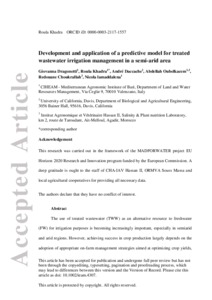Dragonetti, Giovanna ; Khadra, Roula ; Daccache, André ; Oubelkacem, Abdellah ; Choukrallah, Redouane
(2020)
Development and Application of a Predictive Model for Treated Wastewater Irrigation Management in a Semiarid Area.
Integrated Environmental Assessment and Management
.
ISSN 1551-3793
Full text disponibile come:
![[thumbnail of postprint]](https://amsacta.unibo.it/6493/1.hassmallThumbnailVersion/Dragonetti_2020_IEAM4307_postprint.pdf)  Anteprima |
Documento di testo(pdf) (postprint)
Licenza: Salvo eventuali più ampie autorizzazioni dell'autore, il contributo può essere liberamente consultato e può essere effettuato il salvataggio e la stampa di una copia per fini strettamente personali di studio, di ricerca e di insegnamento, con espresso divieto di qualunque utilizzo direttamente o indirettamente commerciale. Ogni altro diritto sul materiale è riservato.
Download (1MB)
| Anteprima
|
Abstract
The use of treated wastewater (TWW) as an alternative resource to fresh water (FW) for irrigation purposes is becoming increasingly important, especially in semiarid and arid regions. However, achieving success in crop production largely depends on the adoption of appropriate on‐farm management strategies aimed at optimizing crop yields, maintaining soil productivity and safeguarding the environment. For this purpose, predictive models are of particular interest. A safe irrigation management (SIM) model developed and tested in this research was used to schedule irrigation under controlled management tailored to the use of 1) TWW and 2) FW and to reproduce farmers' strategies. These management strategies aim to improve actual irrigation practices, accounting for water quality, soil characteristics, and crop yield. The results of the application of SIM on a citrus farm in Souss‐Massa, Morocco, show that the management strategy adopted by farmers withdraws considerable amounts of water and results in substantial drainage volumes compared to those in the SIM strategy. In the specific case of TWW, the strategy simulated by the SIM model resulted in a decrease in yield of approximately 4%, compared to the 23% decrease derived from the farmers' traditional strategy. Moreover, SIM allowed for great savings in terms of fertilizing elements and for the reduction in the movement of water and salts beyond the root zone, usually considered the main source of groundwater contamination. These results confirm the appropriateness of using prediction models and the accuracy of the SIM model in adapting irrigation strategies to TWW, which will be an integral part of the strategies that encourage their use in irrigated agriculture.
Abstract
The use of treated wastewater (TWW) as an alternative resource to fresh water (FW) for irrigation purposes is becoming increasingly important, especially in semiarid and arid regions. However, achieving success in crop production largely depends on the adoption of appropriate on‐farm management strategies aimed at optimizing crop yields, maintaining soil productivity and safeguarding the environment. For this purpose, predictive models are of particular interest. A safe irrigation management (SIM) model developed and tested in this research was used to schedule irrigation under controlled management tailored to the use of 1) TWW and 2) FW and to reproduce farmers' strategies. These management strategies aim to improve actual irrigation practices, accounting for water quality, soil characteristics, and crop yield. The results of the application of SIM on a citrus farm in Souss‐Massa, Morocco, show that the management strategy adopted by farmers withdraws considerable amounts of water and results in substantial drainage volumes compared to those in the SIM strategy. In the specific case of TWW, the strategy simulated by the SIM model resulted in a decrease in yield of approximately 4%, compared to the 23% decrease derived from the farmers' traditional strategy. Moreover, SIM allowed for great savings in terms of fertilizing elements and for the reduction in the movement of water and salts beyond the root zone, usually considered the main source of groundwater contamination. These results confirm the appropriateness of using prediction models and the accuracy of the SIM model in adapting irrigation strategies to TWW, which will be an integral part of the strategies that encourage their use in irrigated agriculture.
Tipologia del documento
Articolo
Autori
Parole chiave
SIM model, Water scarcity, Soil salinity, Morocco, Citrus
Settori scientifico-disciplinari
ISSN
1551-3793
DOI
Data di deposito
12 Ott 2020 10:03
Ultima modifica
28 Feb 2021 22:00
Nome del Progetto
Programma di finanziamento
EC - H2020
URI
Altri metadati
Tipologia del documento
Articolo
Autori
Parole chiave
SIM model, Water scarcity, Soil salinity, Morocco, Citrus
Settori scientifico-disciplinari
ISSN
1551-3793
DOI
Data di deposito
12 Ott 2020 10:03
Ultima modifica
28 Feb 2021 22:00
Nome del Progetto
Programma di finanziamento
EC - H2020
URI
Statistica sui download
Statistica sui download
Gestione del documento:



 Login per gli autori
Login per gli autori



